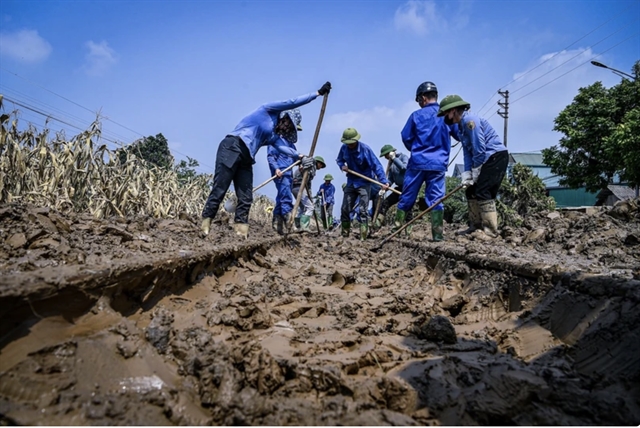 Environment
Environment

 |
| Railway workers clear mud from the tracks to ensure train operations. VNA/VNS Photo |
HÀ NỘI – Việt Nam Railway Corporation (VNR) has reported that the sector suffered about VNĐ180 billion (US$7.3 million) in damages due to Typhoon Yagi.
VNR has submitted an updated damage report to the State Capital Management Committee at enterprises, detailing the consequences of the typhoon and its aftermath.
According to that report, the damage to rail infrastructure assets, which were State-invested, is estimated at around VNĐ130 billion (approximately US$5.4 million) including more than 30 locations where landslides buried railway tracks.
Over 40 spots were flooded or were where roadbeds and ballast were washed away and there were hundreds of cases where trees or architectural structures fell onto tracks or cut signal communication lines.
In addition, VNR suffered losses amounting to VNĐ48 billion ($1.93 million), with VNĐ20 billion ($828,000) attributed to company-invested assets.
This includes 17 locomotives and numerous pieces of equipment submerged in water and several supply depots, track maintenance stations, accommodation units and office buildings having their roofs blown off or boundary walls collapsing.
Furthermore, the revenue loss from railway transport amounted to VNĐ28 billion ($1.1 million) due to the cancellation of more than 22 freight trains and over 54 passenger trains.
“To proactively respond and rectify the issues caused by Typhoon Yagi and its aftermath, VNR has been urgently repairing and restoring the damaged rail infrastructure, as well as reviving rail transport and business operations,” said Hoàng Gia Khánh, VNR general director.
Additionally, the corporation has been transporting 620.6 tonnes of essential goods such as food, water, medicine, clothing, books and medical equipment from Bình Dương Province’s Sóng Thần and Khánh Hoà Province’s Nha Trang stations to Hà Nội’s Giáp Bát Station, and Yên Bái and Lào Cai provinces.
To restore rail infrastructure and stabilise the business operations of the company, as well as the lives of workers impacted by the typhoon, VNR has requested that the State Capital Management Committee petition the Prime Minister and consult the Ministry of Transport and the Ministry of Finance to allocate sufficient funds for repair works on State-invested assets.
Regarding the losses sustained from company-invested assets and the decline in railway transport revenue, VNR has proposed that the authorities continue the policy of reducing fees for the use of rail infrastructure.
The corporation also requested tax exemptions or reductions to assist the company in overcoming difficulties and swiftly resuming business operations.
Given the ongoing challenges faced by VNR in its business activities, which limit its ability to support employees, the corporation has also called on local authorities and relevant agencies to implement support policies to help stabilise the lives of railway workers. VNS




